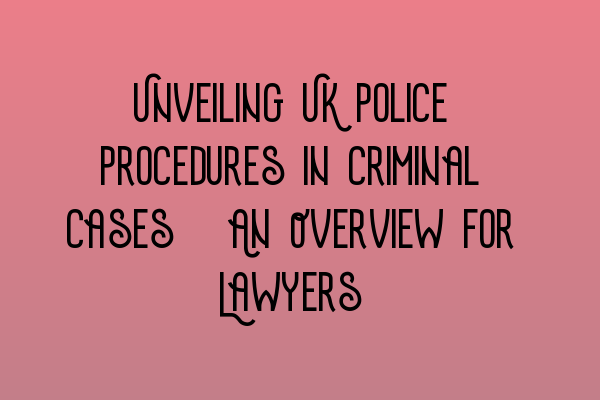Unveiling UK Police Procedures in Criminal Cases: An Overview for Lawyers
As lawyers practicing criminal law in the UK, it is essential to have a comprehensive understanding of the police procedures involved in criminal cases. Being well-versed in police practices not only strengthens your ability to represent your clients effectively but also ensures their rights are protected throughout the legal process.
The Role of UK Police in Criminal Cases
The police play a crucial role in the investigation and enforcement of criminal laws in the UK. Their primary responsibilities include:
- Gathering evidence
- Interviewing witnesses
- Arresting suspects
- Conducting searches
- Submitting case reports to the Crown Prosecution Service (CPS)
Understanding these procedures is vital for lawyers as it allows them to navigate the complexities of the criminal justice system and adequately represent their clients.
Arrest and Detention Procedures
In criminal cases, the police have the power to arrest and detain individuals who are suspected of committing an offense. It is crucial to familiarize yourself with the key aspects of arrest and detention procedures, such as:
- Grounds for arrest
- Requirements for detention
- Interviewing suspects
- Rights of the arrested person
Understanding these procedures enables lawyers to identify any breaches and safeguards their clients’ rights during the investigation.
Investigation and Evidence Gathering
Police officers are responsible for conducting a thorough investigation and gathering evidence to build a case against the accused. This includes:
- Crime scene examination
- Interviewing witnesses and victims
- Obtaining forensic evidence
- Surveillance and intelligence gathering
Lawyers must have a solid understanding of these procedures to effectively challenge the evidence presented by the prosecution and ensure a fair trial for their clients.
Search and Seizure
The police have the authority to conduct searches and seize evidence during the investigation of a criminal case. It is essential for lawyers to be familiar with the rules and limitations surrounding search and seizure procedures, including:
- Search warrants
- Search and seizure of property
- Rights of the person being searched
By understanding these procedures, lawyers can challenge any improper search or seizure that may have occurred, ultimately protecting their clients’ rights.
Interaction with the Crown Prosecution Service (CPS)
Once the police have completed their investigation, they submit the case reports to the Crown Prosecution Service (CPS). The CPS then determines whether there is sufficient evidence to proceed with a prosecution. Lawyers should be aware of the interaction between the police and the CPS to effectively communicate and negotiate on behalf of their clients.
Stay Informed and Expand Your Expertise
As the legal landscape continues to evolve, it is crucial for lawyers to stay informed and continuously expand their expertise. Workshops and seminars on criminal practice provide excellent opportunities to enhance your knowledge and skills in this dynamic field. Check out our Workshops and Seminars on Criminal Practice: Expanding Your Expertise to discover upcoming events.
Continual updates in UK criminal laws require lawyers to remain up-to-date to provide accurate advice and representation. Learn more about Updates in UK Criminal Laws: Staying Informed and Prepared to ensure you are well-equipped to navigate the ever-changing legal landscape.
Enhance Your SQE Criminal Law Study Group Experience
Studying criminal law can be challenging, but joining a study group can enhance your learning experience. Discover effective study techniques, discuss complex cases, and connect with fellow aspiring lawyers. Learn more about Enhancing Your SQE Criminal Law Study Group Experience to embark on a fruitful learning journey.
Deep Dive into Fraud and Financial Crimes in the UK
Fraud and financial crimes present unique challenges in the field of criminal law. Delve into the intricacies of these offenses and learn effective defense strategies. Check out our comprehensive guide on Deep Dive into Fraud and Financial Crimes in the UK.
In conclusion, familiarizing yourself with UK police procedures in criminal cases is crucial for lawyers representing clients in the criminal justice system. By understanding the various stages of investigation, arrest, evidence gathering, and interaction with the CPS, lawyers can provide effective representation and protect their clients’ rights. Expand your expertise and stay informed with our related articles to excel in the field of criminal law.
